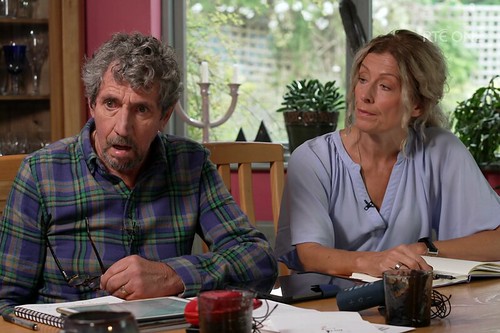I rarely watch TV talk shows, so I haven't bothered to tune into the new ABC talk show Frankly.
But sometimes I take a look at The Late Late Show with Ryan Tubridy, on RTÉ Player, the Irish national broadcaster's equivalent of ABC iView.
I'm always curious to learn more about the land of my forbears, and streaming a local TV program from another country makes me feel like I'm travelling there.
A recent episode included an interview with the 73 year old intrepid journalist legend Charlie Bird, whose life has changed radically since his Motor Neurone Disease diagnosis last year.
His mobility is compromised and he can no longer speak. But his mind is as sharp as ever.
So Ryan Tubridy journeyed to his home in County Wicklow to conduct the exceptionally moving interview alongside his partner Claire, using artificial voice technology.
Bird told him: 'I don't feel cheated, I have been very fortunate in my career in broadcasting. I have travelled to many parts of the world in my amazing life.'
One part of the world he travelled to was the Philippines, in 1983. I know, because I was there, and met him.
It was during the summer break from university. The Jesuits had sent me to travel around the Philippines for three months.
I visited the Negros Nine in a regional jail on the sugar-producing island of Negros, in the Visayas in the centre of the country.
The Negros Nine was a group of church activists that included Australian priest Brian Gore, Irish priest Niall O'Brien, Filipino priest Vicente Dangan, and six lay associates.
They had been falsely charged with multiple murders. In reality, they were being punished for emboldening oppressed workers to stand up for their rights.
I met the three priests, along with three journalists. They included Charlie Bird, an ABC correspondent and a journalist from the Brisbane Catholic Leader.
I did not know what had made him so famous in his home country in the intervening decades. So earlier today, I took a look at his Wikipedia entry.
Summarising his eventful career, it says that for many years in the 1990s, he was the point of contact between RTÉ and the Provisional IRA.
Then in 2006 he was injured while covering the Dublin Riots of 2007. As a youth, he had taken an interest in far left politics as a member of the Irish Young Socialists.
It's clear that he lived at least the first part of the journalist's ideal to act 'without fear or favour'. It seems that has prepared him well to face death without fear.
